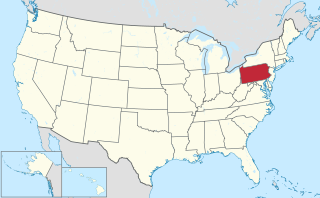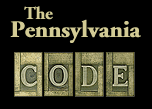
The Code of Federal Regulations (CFR) is the codification of the general and permanent rules and regulations published in the Federal Register by the executive departments and agencies of the federal government of the United States. The CFR is divided into 50 titles that represent broad areas subject to federal regulation.
A by-law is a rule or law established by an organization or community to regulate itself, as allowed or provided for by some higher authority. The higher authority, generally a legislature or some other government body, establishes the degree of control that the by-laws may exercise. By-laws may be established by entities such as a business corporation, a neighborhood association, or depending on the jurisdiction, a municipality.

The Federal Register is the official journal of the federal government of the United States that contains government agency rules, proposed rules, and public notices. It is published daily, except on federal holidays. The final rules promulgated by a federal agency and published in the Federal Register are ultimately reorganized by topic or subject matter and codified in the Code of Federal Regulations (CFR), which is updated annually.

The Supreme Court of Pennsylvania is the highest court in the Commonwealth of Pennsylvania's Unified Judicial System. It also claims to be the oldest appellate court in the United States, a claim that is disputed by the Massachusetts Supreme Judicial Court. The Supreme Court of Pennsylvania began in 1684 as the Provincial Court, and casual references to it as the "Supreme Court" of Pennsylvania were made official in 1722 upon its reorganization as an entity separate from the control of the royal governor. Today, the Supreme Court of Pennsylvania maintains a discretionary docket, meaning that the Court may choose which cases it accepts, with the exception of mandatory death penalty appeals, and certain appeals from the original jurisdiction of the Commonwealth Court. This discretion allows the Court to wield powerful influence on the formation and interpretation of Pennsylvania law.
The Massachusetts General Laws is a codification of many of the statutes of the Commonwealth of Massachusetts. The Commonwealth's laws are promulgated by an elected bicameral ("two-chamber") legislative body, the Massachusetts General Court. The resulting laws—both Session Laws and General Laws—together make up the statutory law of the Commonwealth.
The Pennsylvania Liquor Control Board (PLCB) is an independent government agency that manages the beverage alcohol industry in Pennsylvania by administering the Pennsylvania Liquor Code. It is responsible for licensing the possession, sale, storage, transportation, importation and manufacture of wine, spirits and malt or brewed beverages in the commonwealth, as well as operating a system of liquor distribution (retailing) and providing education about the harmful effects of underage and dangerous drinking.

The Code of Virginia is the statutory law of the U.S. state of Virginia, and consists of the codified legislation of the Virginia General Assembly. The 1950 Code of Virginia is the revision currently in force. The previous official versions were the Codes of 1819, 1849, 1887, and 1919, though other compilations had been printed privately as early as 1733, and other editions have been issued that were not designated full revisions of the code.

A Pennsylvania township or township under Pennsylvania laws is one class of the three types of municipalities codified, in Pennsylvania—smaller municipal class legal entities providing local self-government functions in the majority of land areas in the more rural regions. Townships act as the lowest level municipal corporations of governance of the Commonwealth of Pennsylvania, a U.S. state of the United States of America.

The Pennsylvania Gaming Control Board is a governmental agency of the Commonwealth of Pennsylvania, founded in 2004 as the state licensing and regulatory agency responsible for overseeing slot machines and casino gambling in the state.

The University of Pennsylvania Press is a university press affiliated with the University of Pennsylvania located in Philadelphia, Pennsylvania.
The Uniform Firearms Act (UFA) is a set of statutes in the Commonwealth of Pennsylvania that defines the limits of Section 21 of the Pennsylvania Constitution, the right to bear arms, which predates the United States Constitution and reads: "The right of the citizens to bear arms in defense of themselves and the State shall not be questioned." The laws range in scope from use of force in self-defense situations, to specific categories citizens that are ineligible to purchase or possess firearms.
The Pennsylvania Department of Military and Veterans Affairs (DMVA) was established on April 11, 1793, by the Pennsylvania General Assembly. It is overseen by the adjutant general, a cabinet-level position appointed by the governor.
A home rule municipality in Pennsylvania is one incorporated under its own unique charter, created pursuant to the state's Home Rule and Optional Plans Law and approved by referendum. "Local governments without home rule can only act where specifically authorized by state law; home rule municipalities can act anywhere except where they are specifically limited by state law". Although many such municipalities have retained the word "Township" or "Borough" in their official names, the Pennsylvania Township and Borough Codes no longer apply to them. All three types of municipalities may become a home rule municipality.
In the United States, there is no federal law regulating the practice of tattooing. However, all 50 states and the District of Columbia have statutory laws requiring a person receiving a tattoo be 12 years or older'. This is partially based on the legal principle that a minor cannot enter into a legal contract or otherwise render informed consent for a procedure. Most states permit a person under the age of 18 to receive a tattoo with permission of a parent or guardian, but some states outright prohibit tattooing under a certain age regardless of permission, with the exception of medical necessity.
The Unified Judicial System of Pennsylvania is the unified state court system of the Commonwealth of Pennsylvania.

Gun laws in Pennsylvania regulate the sale, possession, and use of firearms and ammunition in the Commonwealth of Pennsylvania in the United States.









